Pennon Group Bundle
Who Are Pennon Group's Customers, and Why Does It Matter?
In an era defined by environmental consciousness and evolving consumer needs, understanding the Pennon Group SWOT Analysis is crucial. The water and wastewater industry, alongside waste management, is experiencing a profound transformation, making it essential for companies like Pennon Group to precisely identify their
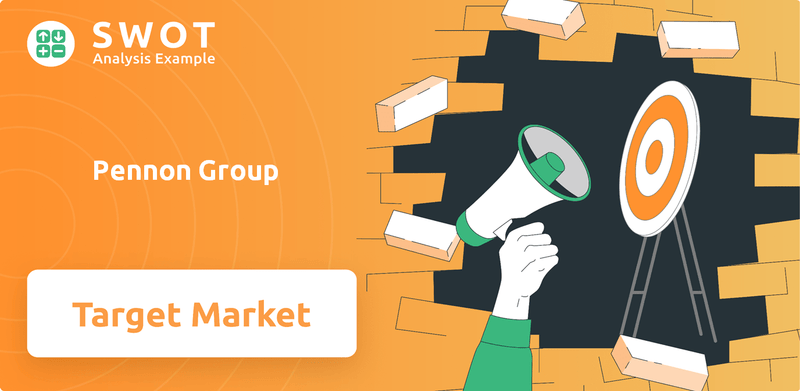
This exploration provides a comprehensive
Who Are Pennon Group’s Main Customers?
Understanding the Growth Strategy of Pennon Group requires a close look at its primary customer segments. The company, focusing on water and wastewater services, primarily serves two main categories: consumers (B2C) and businesses (B2B). This customer segmentation strategy is crucial for effective market analysis and business strategy.
The customer demographics for Pennon Group are largely defined by the geographic areas it serves. The B2C segment consists mainly of residential households across Devon, Cornwall, and parts of Dorset and Somerset. The B2B segment includes a diverse range of businesses, from small local enterprises to large industrial operations.
The company's strategic focus has shifted back to its core regulated water business after divesting Viridor. This move has refined its customer segmentation, concentrating on residential and business customers within its water and wastewater service areas.
The B2C segment encompasses residential households in the South West of England. This segment is diverse in age, income, and family status, reflecting the general population demographics of the region. The demand for clean water and wastewater services is universal, making traditional demographic criteria less relevant.
The B2B segment includes various commercial and industrial clients. These businesses have varying water consumption and wastewater discharge needs. Key sub-segments include agricultural businesses, hospitality venues, and manufacturing plants. These customers require tailored services based on their industry-specific needs.
Pennon Group's customer base is primarily located in the South West of England, with a focus on water and wastewater services. The target market size is significant, given the essential nature of these services. Customer acquisition and retention strategies are centered around providing reliable and efficient services to both residential and business customers.
- Customer Segmentation: The company segments its customers into residential and business categories to tailor services effectively.
- Geographic Focus: The primary customer location data is concentrated in Devon, Cornwall, and parts of Dorset and Somerset.
- Service Needs: Understanding customer buying habits, such as water consumption and wastewater discharge, is crucial for service delivery.
- Regulatory Compliance: Businesses are driven by regulatory compliance and cost-effectiveness in waste disposal.
Pennon Group SWOT Analysis
- Complete SWOT Breakdown
- Fully Customizable
- Editable in Excel & Word
- Professional Formatting
- Investor-Ready Format
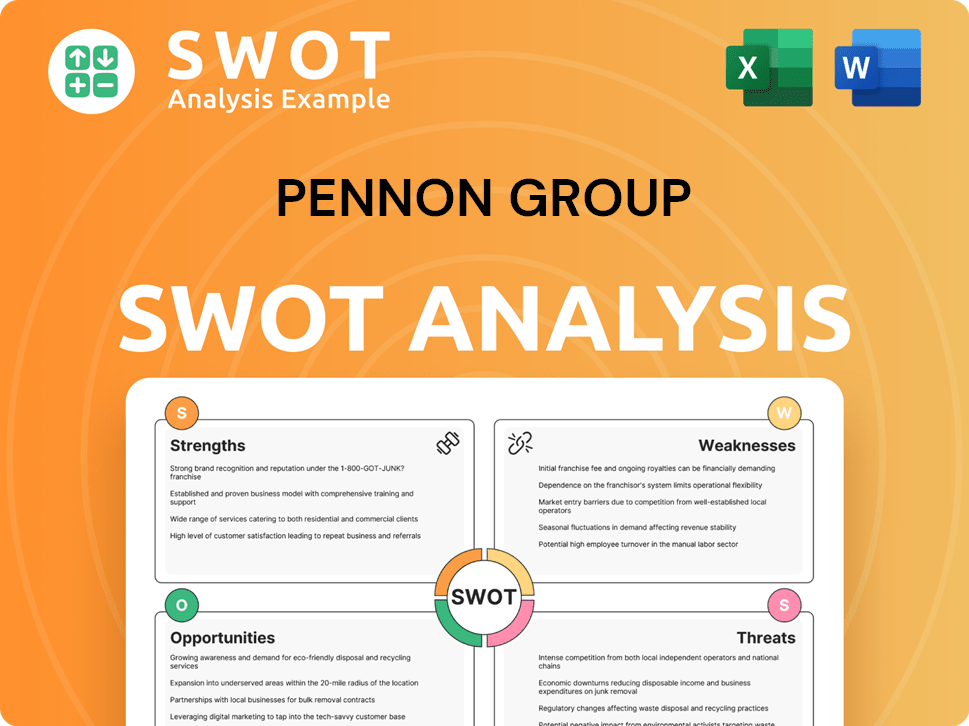
What Do Pennon Group’s Customers Want?
Understanding the customer needs and preferences is crucial for the success of the business. The core of the business’s customer needs and preferences revolves around the demand for reliable, high-quality, and affordable water and wastewater services, along with rising expectations for environmental responsibility and excellent customer service. This focus is essential for effective market analysis and the development of a robust business strategy.
For residential customers, the primary needs are consistent water supply, safe drinking water, and effective wastewater treatment. These needs are non-discretionary, and customer loyalty is linked to uninterrupted service, fair pricing, and responsive problem resolution. Psychological factors, like peace of mind regarding health and hygiene, and practical factors, related to daily life functionality, also play a significant role.
Common pain points for customers include supply interruptions, billing inaccuracies, and concerns about water quality or environmental impact. Addressing these issues is a key part of the company’s operational strategy. The company’s approach to customer service and operational improvements is also influenced by customer feedback mechanisms.
For business customers, particularly those requiring larger volumes or specialized services, needs extend to efficient supply, compliance with environmental regulations, and robust support for operational continuity. Decision-making criteria for businesses often include cost, reliability, regulatory adherence, and potential reputational impact. The company tailors its engagement with business customers through dedicated account management and bespoke service agreements where appropriate. The company’s commitment to environmental performance, as evidenced by its net zero targets and efforts to reduce pollution, resonates with customers who prioritize sustainability.
- Customer Demographics: The customer base includes both residential and business customers across various geographic locations.
- Target Market: The primary target market includes households and businesses within the areas served by the company, focusing on those with high water usage needs.
- Market Analysis: The company conducts regular market analysis to understand customer needs, preferences, and emerging trends.
- Customer Segmentation: Customers are segmented based on their usage patterns, location, and specific needs (residential vs. commercial).
- Business Strategy: The company’s business strategy involves continuous investment in infrastructure, customer service improvements, and environmental sustainability initiatives.
The company's commitment to these areas is reflected in its operational plans and financial investments. For example, the company's business plan for 2025-2030 outlines substantial capital expenditure aimed at improving service resilience, reducing pollution incidents, and enhancing water quality, directly addressing customer concerns. For more details, you can read a Brief History of Pennon Group.
Pennon Group PESTLE Analysis
- Covers All 6 PESTLE Categories
- No Research Needed – Save Hours of Work
- Built by Experts, Trusted by Consultants
- Instant Download, Ready to Use
- 100% Editable, Fully Customizable
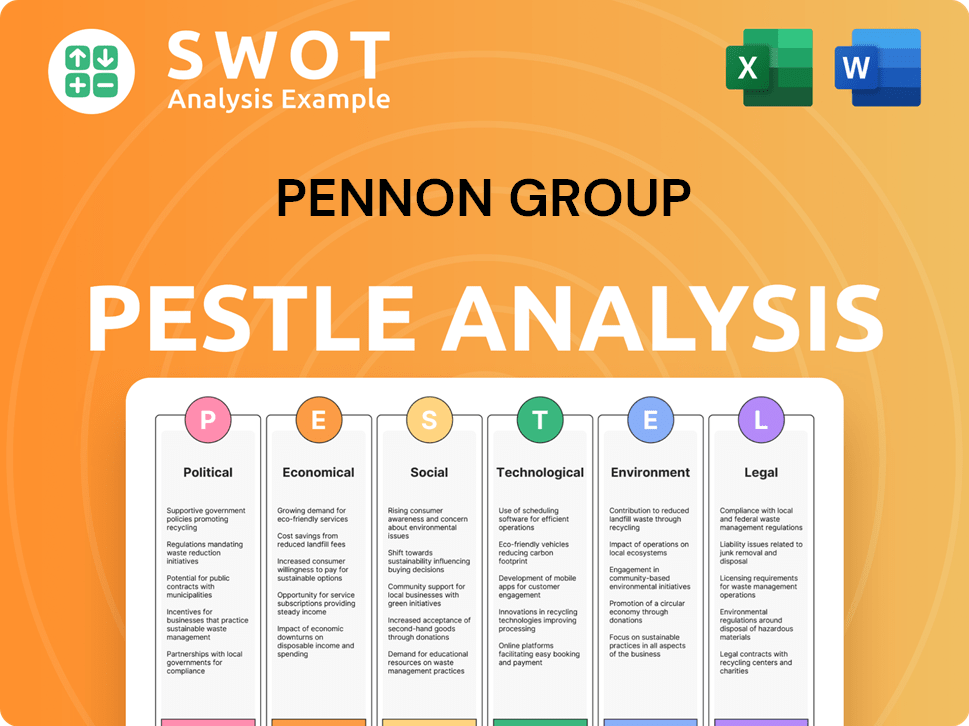
Where does Pennon Group operate?
The Pennon Group's primary geographical market presence is concentrated in the South West of England. This focus is primarily on providing water and wastewater services. This region encompasses Devon, Cornwall, and parts of Dorset and Somerset, establishing a strong, largely monopolistic market share for its regulated water services.
Within this area, the company serves approximately 1.7 million customers. The nature of utility provision allows for a well-established brand recognition within these specific counties. This concentration allows for a targeted approach to Customer Demographics and service delivery.
The Target Market is primarily defined by the geographical boundaries of its water and wastewater service areas. The company's operations are deeply rooted in the South West, with strategic decisions aimed at strengthening its regional presence.
Pennon Group's focus is on the South West of England. This region is where the company's core operations are centered, particularly in water and wastewater services.
The company serves about 1.7 million customers. This customer base is primarily located within the counties of Devon, Cornwall, and parts of Dorset and Somerset.
Recent strategic moves, such as the acquisition of Bristol Water in 2021, have further cemented Pennon's presence within the South West. This expansion aims to enhance service delivery in its core regional market.
The divestment of Viridor in 2021 streamlined the company's geographical presence. This strategic shift intensified the focus on water and wastewater services in the South West.
Differences in Customer Segmentation are present, with coastal areas experiencing seasonal population changes due to tourism. Rural areas may have different infrastructure challenges compared to urban centers. Pennon Group localizes its offerings through operational presence and community engagement.
Pennon Group's core operations are centered in the South West of England. This regional focus is strategic, concentrating on water and wastewater services.
The company serves approximately 1.7 million customers. This customer base is primarily located within the counties of Devon, Cornwall, and parts of Dorset and Somerset.
Acquisitions like Bristol Water in 2021 have strengthened Pennon's presence in the South West. These moves aim to leverage synergies and improve service delivery.
Pennon Group tailors its offerings to specific localities within its service area. This includes operational presence and community engagement initiatives.
Coastal areas experience seasonal population fluctuations due to tourism. Rural areas face different infrastructure challenges compared to urban centers.
The company's Business Strategy involves consolidating its regional focus. This is achieved through strategic acquisitions and streamlined operations.
Pennon Group Business Model Canvas
- Complete 9-Block Business Model Canvas
- Effortlessly Communicate Your Business Strategy
- Investor-Ready BMC Format
- 100% Editable and Customizable
- Clear and Structured Layout
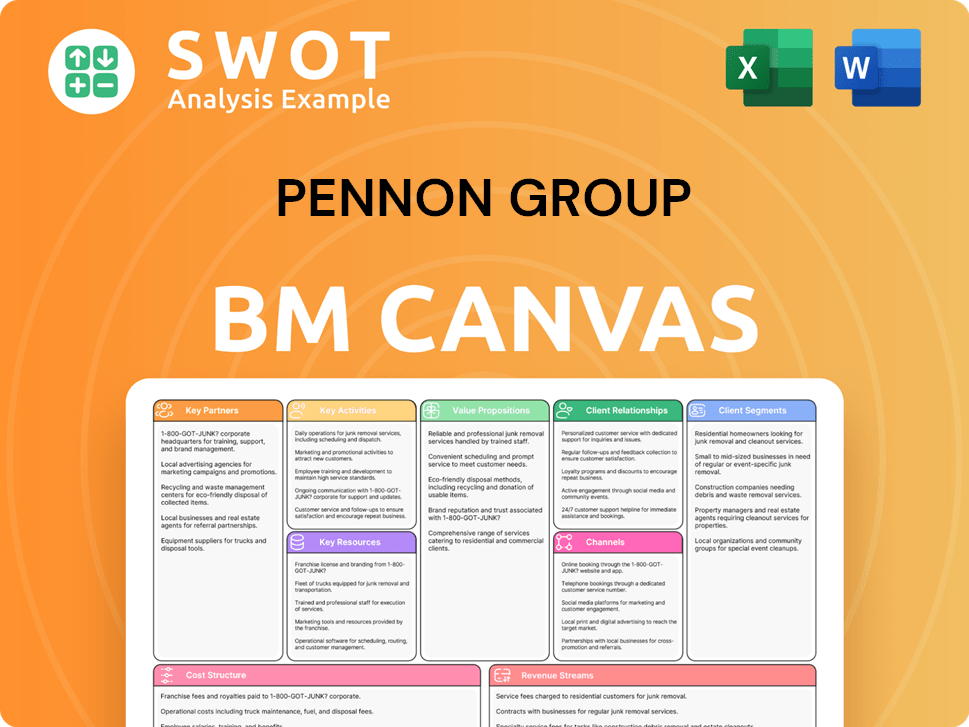
How Does Pennon Group Win & Keep Customers?
For the Pennon Group, customer acquisition and retention strategies are heavily influenced by its role as a regulated utility, particularly through its South West Water subsidiary. The focus is less on acquiring new customers in a competitive market and more on onboarding new properties and retaining existing customers. This approach is driven by regulatory requirements and a commitment to providing essential services.
Customer retention is a top priority, centered on service reliability, water quality, and effective customer support. The company uses various communication channels, including digital platforms and direct customer service, to manage accounts and resolve issues. It leverages customer data and CRM systems to track interactions and service history, ensuring compliance with regulatory obligations.
The company's 2025-2030 plan includes significant investments to improve customer service, reduce leakage, and enhance environmental performance. These initiatives are designed to boost customer satisfaction and loyalty. While traditional marketing is less about acquiring new customers, the company emphasizes its social and environmental contributions to positively influence customer perception.
Proactive communication during infrastructure works is a key strategy. This helps manage customer expectations and minimize disruptions. Keeping customers informed about potential service interruptions builds trust and reduces complaints. Effective communication is crucial for maintaining customer satisfaction.
A rapid response to service issues is essential for customer retention. Quick resolution of problems demonstrates a commitment to service reliability. This includes efficient handling of leaks, water quality concerns, and billing inquiries, which directly impacts customer satisfaction.
Investment in customer-facing technology enhances self-service options. This includes online portals and mobile apps that allow customers to manage their accounts. These tools improve convenience, reduce the need for direct customer service interactions, and enhance the overall customer experience.
Commitment to environmental performance and community engagement builds customer loyalty. This includes initiatives like water conservation programs and supporting local projects. Highlighting these efforts enhances the company's reputation and fosters positive customer perceptions.
The Marketing Strategy of Pennon Group focuses on informing and engaging existing customers rather than acquiring new ones. The company highlights its social and environmental contributions to build customer loyalty and trust. The PR24 Final Determination for 2025-2030 outlines significant investments to improve customer service, reduce leakage, and enhance environmental performance, all of which are critical for customer satisfaction and retention.
Pennon Group Porter's Five Forces Analysis
- Covers All 5 Competitive Forces in Detail
- Structured for Consultants, Students, and Founders
- 100% Editable in Microsoft Word & Excel
- Instant Digital Download – Use Immediately
- Compatible with Mac & PC – Fully Unlocked
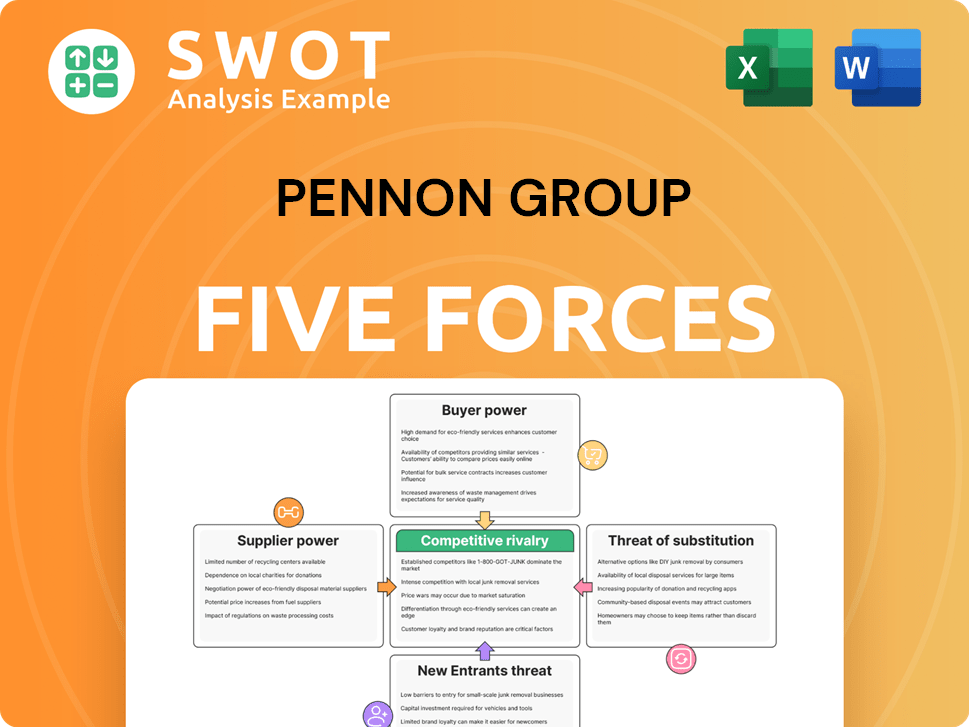
Related Blogs
- What are Mission Vision & Core Values of Pennon Group Company?
- What is Competitive Landscape of Pennon Group Company?
- What is Growth Strategy and Future Prospects of Pennon Group Company?
- How Does Pennon Group Company Work?
- What is Sales and Marketing Strategy of Pennon Group Company?
- What is Brief History of Pennon Group Company?
- Who Owns Pennon Group Company?
Disclaimer
All information, articles, and product details provided on this website are for general informational and educational purposes only. We do not claim any ownership over, nor do we intend to infringe upon, any trademarks, copyrights, logos, brand names, or other intellectual property mentioned or depicted on this site. Such intellectual property remains the property of its respective owners, and any references here are made solely for identification or informational purposes, without implying any affiliation, endorsement, or partnership.
We make no representations or warranties, express or implied, regarding the accuracy, completeness, or suitability of any content or products presented. Nothing on this website should be construed as legal, tax, investment, financial, medical, or other professional advice. In addition, no part of this site—including articles or product references—constitutes a solicitation, recommendation, endorsement, advertisement, or offer to buy or sell any securities, franchises, or other financial instruments, particularly in jurisdictions where such activity would be unlawful.
All content is of a general nature and may not address the specific circumstances of any individual or entity. It is not a substitute for professional advice or services. Any actions you take based on the information provided here are strictly at your own risk. You accept full responsibility for any decisions or outcomes arising from your use of this website and agree to release us from any liability in connection with your use of, or reliance upon, the content or products found herein.